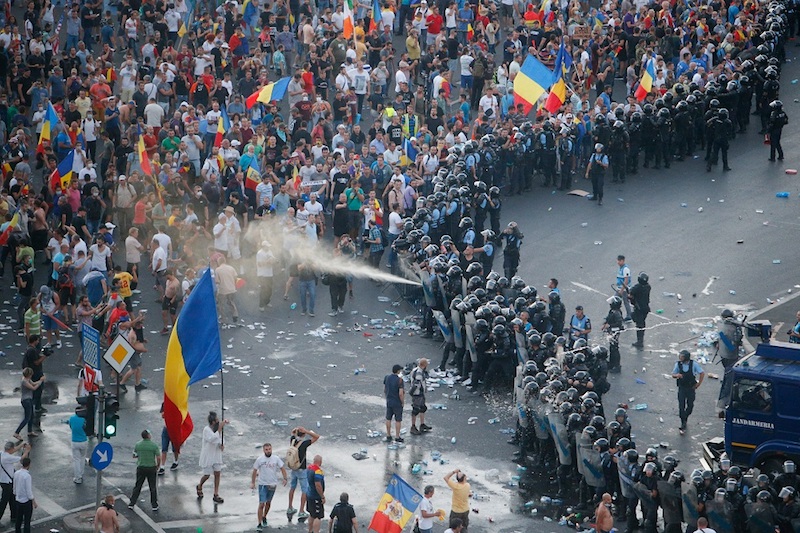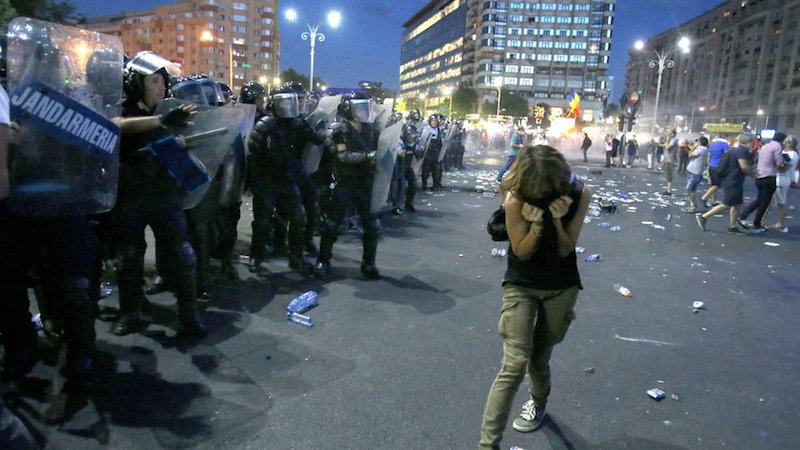Romanian riot police used tear gas and water cannons in clashes with anti-corruption protesters in Bucharest on Friday, as tens of thousands called on the government to resign.
The crowd chanted “resign” and “thieves” as they assembled in outside the main government building in the Romanian capital.
Centrist Romanian president Klaus Iohannis condemned the police’s use of force as disproportionate. “I firmly condemn riot police’s brutal intervention, strongly disproportionate to the actions of the majority of people in the square,” he said on his Facebook page. “The interior ministry must explain urgently the way it handled tonight’s events.”

Tens of thousands of protesters rallied against the ruling Social Democrat (PSD) government on Friday
Romania ranks as one of the EU’s most corrupt states and Brussels keeps its justice system under special monitoring.
Local media said between 30,000 to 50,000 people turned out for the protest, included many Romanian expatriates who returned home to show their anger at the corruption under the ruling Social Democrat (PSD) government.
Romanians working abroad are angry at what they say is entrenched corruption, low wages and attempts by the PSD to weaken the judiciary in one of the European Union’s most corrupt states.
Some protesters attempted to force their way through security lines guarding government buildings in Bucharest. Others threw bottles and rocks at riot police, who called the groups “provocateurs”.
More than 400 people required medical assistance, the Romanian emergency intervention agency said, including two riot police who became separated from their unit.
Tens of thousands of people staged peaceful protests in other Romanian cities.
Peaceful protests have repeatedly been held since the PSD took power in early 2017 and tried to decriminalise several corruption offences.
This year the SPD government pushed changes to the criminal code through parliament that have raised concerns from the European commission and US state department. The changes are being challenged in the constitutional court.
In July, Romania’s chief anti-corruption prosecutor Laura Codruta Kovesi was sacked at the behest of a government that she accused of trying to muzzle the justice system.

Laura Codruta Kovesi
President Klaus Iohannis reluctantly signed a decree to remove Kovesi, bowing to a constitutional court ruling that he could not block justice minister Tudorel Toader’s decision to fire her.
Kovesi who was the head of Romania’s national anti-corruption directorate (DNA) urged compatriots and colleagues not to abandon the fight against graft.
The Romanian government said she had abused her power, even as she was hailed internationally for prosecuting government ministers, deputies, mayors and powerful businessmen in one of the EU’s most corrupt states.
Since taking power in January 2017, the scandal-plagued PSD has sought to soften anti-corruption legislation, prompting Romania’s biggest street protests since its 1989 anti-communist revolution.













